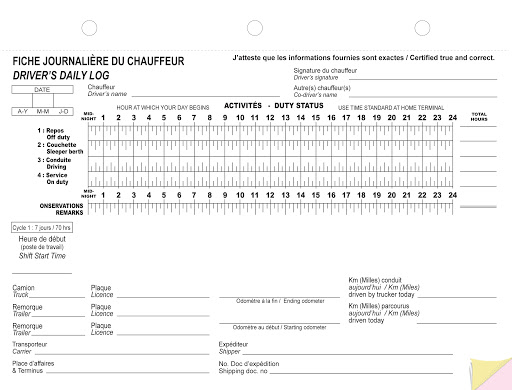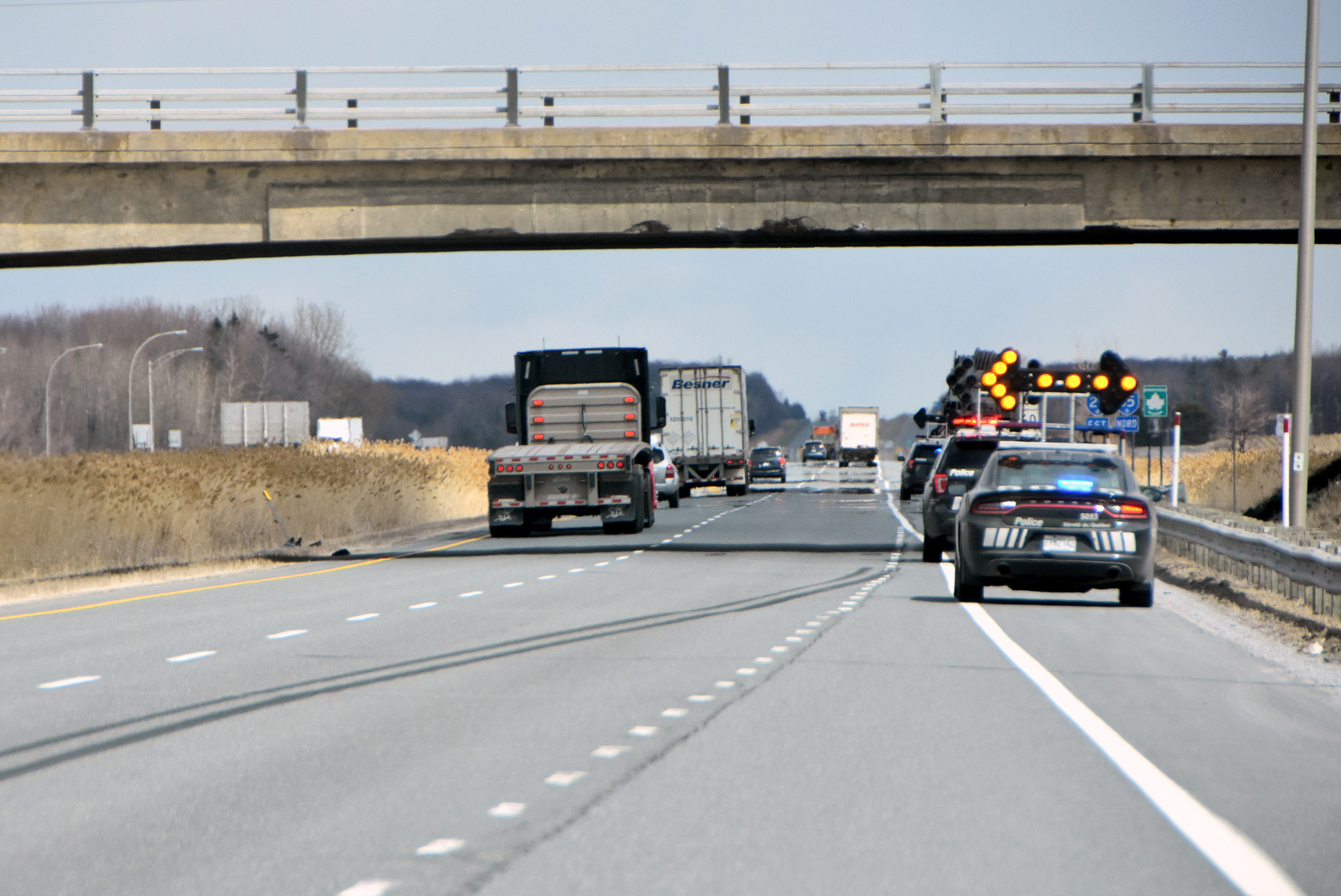| Driving a vehicle without holding a licence of the proper class or without having the prescribed endorsements
|
| Holding more than one learner’s licence, more than one probationary licence or more than one driver’s licence of the same class
|
| Allowing another person to drive using one’s own driver’s licence, or driving using another person’s licence
|
| Failing to comply with the conditions attached to a driver’s licence
|
| -
Driving a vehicle while holding a learner’s licence without being assisted by a person holding the proper licence
-
Driving a vehicle while holding a learner’s licence and being assisted by a person who does not hold the proper licence
|
| Refusing to surrender one’s driver’s licence to a peace officer Driving a road vehicle while being under penalty
|
| Driving a road vehicle while being under penalty
|
| Allowing a person to drive who does not hold a licence of the appropriate class or whose licence is cancelled or suspended
|
| Using a false document that could be mistaken for a licence
|
| Failing to discharge the various obligations required of a driver involved in an accident
|
| Failing to call for a peace officer when involved in an accident causing bodily injury
|
| Failing, as a driver involved in an accident, to provide the information required
|
| Failing to notify a peace officer in case of an accident, in certain circumstances
|
| Failing to clean the headlights, lights and re ectors when ordered to do so by a peace officer
|
| Installing or introducing a radar warning device in a vehicle, or any object that interferes with the functioning of a photo radar device or a red light camera system
|
| Failing to clean the windshield and windows when ordered to do so by a peace officer
|
| Failing to check the brakes where a sign or signal requires a mandatory stop at a brake veri cation area
|
| Driving on a highway where signs or signals prohibit overloaded vehicles not equipped with a braking system prescribed by regulation
|
| Driving on a highway where prohibited by signs or signals for reasons of safety
|
| Speeding in a municipality (31 to 40 km/h over the speed limit)
|
| Driving at a speed over the indicated speed limit in a road construction or maintenance zone (31 to 40 km/h over the speed limit)
|
| Failing to obey orders or signals given by a person in authority (school crossing guard, ag person or peace officer)
|
| Crossing a solid line marking off lanes, where prohibited Driving carelessly or at an unsafe speed
|
| Driving carelessly or at an unsafe speed
|
| Driving at a speed over the prescribed or indicated speed limit (31 to 40 km/h over the speed limit)
|
| Driving a vehicle equipped with a radar warning device, or any object that interferes with the functioning of a radar device or a red light camera system
|
| Carrying out an improper passing manoeuvre
|
| Carrying out an unsafe passing manoeuvre
|
| Failing to obey a red light
|
| Turning right at a red light where prohibited by a sign or signal or, if permitted by a sign or signal, turning right without rst stopping
|
| Failing to obey a ashing red light
|
| Failing to stop at an intersection with an amber light
|
| Failing to reduce speed or to yield the right of way at a ashing amber light
|
| Failing to yield the right of way at a green light or green arrow
|
| Driving in a lane other than the lane indicated by a green arrow pointing downwards
|
| Failing to stop at a traf c light that is defective or not in operation
|
| Failing to obey a stop sign
|
| Failing to yield the right of way to vehicles already travelling in a lane one is about to enter
|
| Wearing an improperly fastened seat belt in a moving vehicle Failing to yield the right of way
|
| Failing to yield the right of way
|
| Failing to yield the right of way to an emergency vehicle with its lights or sound producing device in operation
|
| Failing to reduce speed or change lanes when an emergency vehicle or tow truck with its ashing or rotating lights activated, or a road vehicle with an activated yellow arrow light signal, are stopped on a public highway
|
| Failing to yield the right of way
|
| Failing to stop one’s vehicle at least 5 m from a railway
|
| Entering a level crossing without sufficient space
|
| Failing to stop at a level crossing when driving a bus, a minibus or a heavy vehicle transporting dangerous substances requiring the display of safety marks
|
| Backing up where prohibited on a limited access highway
|
| Backing up where such a manoeuvre is dangerous or obstructs traf c
|
| Driving a vehicle to which a restrictive or prohibitive measure applies
|
| Driving in a race or for a wager or stake
|
| Tolerating that a person ride on the running board or on any outer part of a vehicle in motion, or in the box or dump body of a vehicle in motion
|
| Tolerating that a person hang on to, or be pulled or pushed by, a moving road vehicle
|
| Pulling another vehicle whose wheels remain on the ground, but without using a bar to solidly secure the vehicle
|
| Using a hand-held device that includes a telephone function while driving
|
| Failing to use the ashing red lights or compulsory stop signal when stopping to take on or discharge passengers (bus or minibus used to carry school children)
|
| Failing to use the ashing red lights or compulsory stop signal (bus or minibus used to carry school children stopped in single lane)
|
| Failing to stop one’s vehicle at a distance of more than 5 metres from a bus or minibus used to carry school children with its ashing red lights turned on or its compulsory stop signal activated
|
| - Exceeding by 4% to less than 8% the maximum total loaded mass allowed on a public highway
-
Exceeding by less than 4% the maximum total loaded mass allowed on a bridge or an overpass
-
Exceeding by 10% to less than 15% the axle load limit allowed on a public highway, a bridge or an overpass
-
Exceeding the height limit by 0.1 m to less than 0.2 m
-
Exceeding the width limit by 0.2 m to less than 0.4 m
-
Exceeding the length limit by 1 m to less than 2 m
|
| Driving an outsized vehicle without carrying a special permit
|
| Failing to drive one’s vehicle to an inspection station and to facilitate inspection of the vehicle when ordered to do so by a peace officer or when required by a sign or signal
|
| Carrying a load that shifts around on the vehicle or falls from the vehicle, or interferes with its stability or handling
|
| Carrying a load that is not placed, secured or covered in accordance with regulatory standards (according to the amount of the ne)
|
| Failing to drive a vehicle with a load presenting a hazard to a suitable place when ordered to do so by a peace officer
|
| Driving an outsized vehicle without carrying a special permit
|
| Driving a road vehicle or combination of road vehicles without a warning device indicating that the load or equipment extends beyond the rear of the road vehicle or combination of road vehicles by more than one metre
|
| -
Exceeding by 4% to less than 8% the maximum total loaded mass indicated on the special travel permit on a public highway
-
Exceeding by less than 4% the maximum total loaded mass indicated on the special travel permit on a bridge or an overpass
-
Exceeding by 10% to less than 15% the axle load limit indicated on the special travel permit on a public highway, a bridge or an overpass
-
Exceeding the height limit by 0.1 m to less than 0.2 m
-
Exceeding the width limit by 0.2 m to less than 0.4 m
-
Exceeding the length limit by 1 m to less than 2 m
-
Exceeding the overhang limit by 0.5 m to less than 1 m
|
| Failing to conduct the pre-trip inspection or to record observations in the pre-trip inspection report
|
| Failing, as the driver, to complete the pre-trip inspection report for a heavy vehicle
|
| Failing to keep a pre-trip inspection report (report missing), refusing to surrender the report or possessing more than one report
|
| Failing to report a major mechanical defect
|
| Driving a heavy vehicle with a major mechanical defect discovered during a pre-trip inspection
|
| Failing to inform the persons concerned that one’s licence is not valid
|
| Failing to obey a prohibition from driving, particularly in the case of a driver:
-
whose ability to drive is impaired
-
who is subject to an out-of-service order
-
who fails to comply with the standards respecting hours of driving and rest or the conditions attached to a permit
|
| -
Failing to keep the daily logs or to record the required information in them
-
Possessing more than one log for each day • Failing to keep the daily logs on board the vehicle
-
Entering inaccurate information
-
Failing to surrender the daily logs to an inspector or a peace officer
|
| Failing to surrender the leasing contract or service contract to a peace officer
|
| Failing to ensure that the pre-trip inspection has been performed
|
| Failing to place only one pre-trip inspection report on board a heavy vehicle
|
| Failing to inform the owner of any mechanical defects and to forward the report to the owner
|
| Failing to keep the records, reports, les and other documents prescribed
|
| -
Requesting, requiring or allowing a driver to drive:
-
if the driver’s ability to drive is impaired
-
if driving jeopardizes the safety or health of the public, the driver or the employees of the operator
-
if the driver is subject to an out-of-service order
-
if the driver fails to comply with section 519.9 (hours of driving and rest) and 519.10 (daily logs) of the Highway Safety Code
|
| Failing to ensure that a driver complies with certain provisions of the Highway Safety Code respecting hours of driving and rest and daily logs
|
| Failing to require a driver to maintain a daily log
|
| Failing to le the daily logs and supporting documents at the place determined and in accordance with the standards prescribed by regulation
|
| Failing to ensure that a driver drive the vehicle to an inspection station when required
|
| Failing to drive one’s heavy vehicle to an appropriate place (dangerous substances)
|
| Failing to intervene to prevent a driver with an invalid licence from driving
|
| Operating, or failing to intervene to prevent a driver from operating, a vehicle whose braking system has been modified in such a way as to reduce its effectiveness
|
| Failing to comply with a carrier enforcement officer’s order while having a road vehicle in one’s care, possession or control
|
| Failing to surrender books, registers, accounts, records or other documents to the person responsible for inspecting them or failing to cooperate so as to facilitate such an inspection
|
| Failing to stop one’s vehicle when ordered to do so by a peace officer
|
| Hindering a peace officer in the performance of the officer’s duties, namely:
-
misleading a peace officer by concealment or false statements
-
refusing to provide a peace officer with any information or document the officer is entitled to demand or examine
-
concealing or destroying any document or property relevant to an inspection
|
| Violating any of the standards set forth in the Transportation of Dangerous Substances Regulation (according to the amount of the fine)
|





